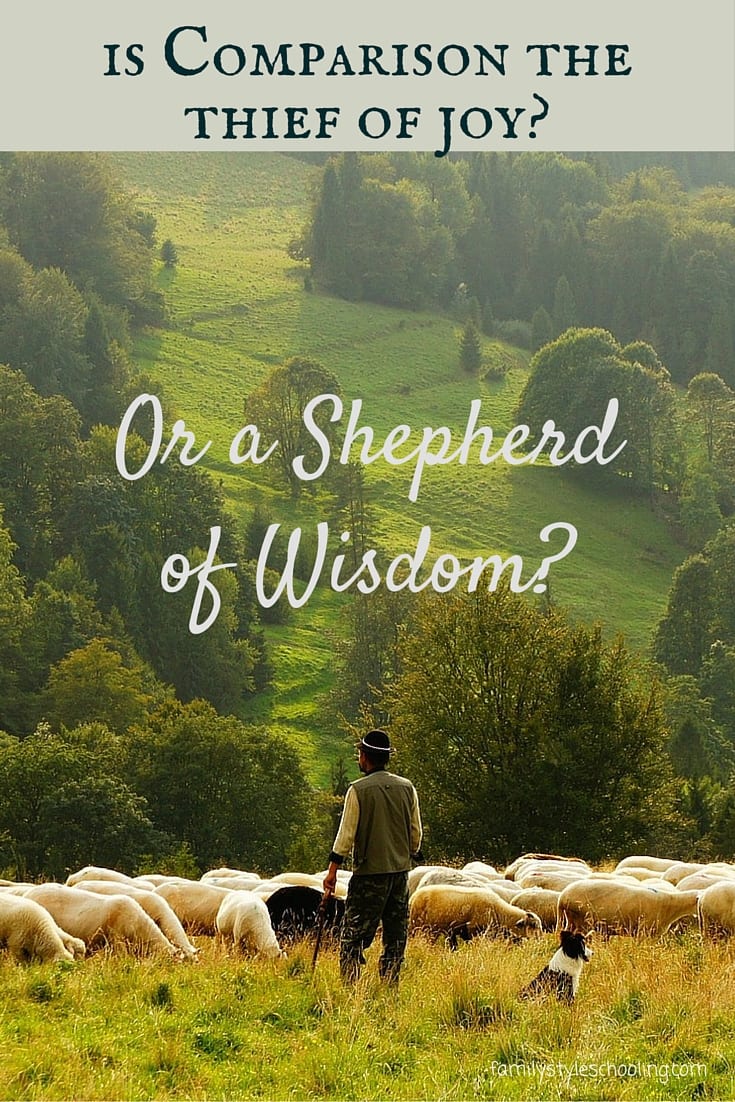The Power of Comparison
I think too often comparison gets a bad rap. Just like chocolate can be bad if misused, comparison isn't the bad guy, it can just be used in harmful ways.
Comparison can be a thief of joy, but it can also be a shepherd of wisdom. What?! You think I'm crazy don't you? I would have agreed with you before we started using the Lost Tools of Learning...which really should be called the Lost Tools of Thinking. I want to share the other side of the comparison story.
With the LTW curriculum, we often use comparison to generate ideas, but a couple of weeks ago, my Challenge I class a discussion that could have only happened through the sweet shepherding of comparison.

This post may contain affiliate links. See my full disclosure policy for more details.
In our Challenge I guide, the task for the week was to compare Billy Bud, Sailor and Through the Gates of Splendor with the purpose of understanding Through the Gates of Splendor better. When I read that instruction, I thought there couldn't be two books more different to compare. What benefit could come from this? And then my class taught me the power of comparison.
Spoiler alert...in order to set the stage for our conversation, I need to fill you in on the summary of the two books. Endings will be spoiled, but getting a peek into our conversation would be worth it!
Billy Bud, Sailor is about a young innocent man who gets a job as a sailor on a war ship. He is naive about the character of his fellow ship mates and foolishly trusts a man set out to ruin him. When falsely accused of mutiny, Billy Bud punches his accuser and accidentally kills him. Billy Bud is then tried, convicted, and executed for his crime.
Through Gates of Splendor, written by Elisabeth Eliot, follows the life of her husband and of four other missionary men who worked to bring the gospel to the jungles of Equador. They spent years working to reach the deadliest tribe known in the area, and when they finally get a chance to connect with the people, they are all killed.
We started out with Socratic circles - half of the class discussing, and the other half observing. The discussion is 100% student led and their task was to compare these two books. I was very curious what would come of this!
Idea 1: Both Men Died Young
This was an interesting start. While they both died very young, the differences started flowing quickly:
- Jim Elliot was prepared to die - and willing if needed
- Billy Budd never saw it coming
- Jim Elliot's death served a greater purpose - the Auca's were saved
- Billy Budd's death seemed useless
This idea sparked a disagreement...did Jim Elliot's death actually bring salvation to the Auca's? There were some that were adamant about the affirmative, and then others that couldn't agree with the logic that their death actually caused the Auca's salvation. It wasn't until after this round of discussion was up, and the observers had a turn to add their thoughts that one young lady chimed in that Jim Elliot said that since Jim was confident in his standing with God, and he was confident that he would be in heaven if he died, he was willing to give his life so that the Auca's could have more time to be reached with the gospel.
Idea 2: Both Men Were Warned
In Billy Budd, Sailor an old man warns Billy that the master of arms of the ship is out to get him. Similarly, in Through Gates of Splendor, Jim is warned about the vicious nature of the Auca's. More ideas that flowed:
- Billy ignores the warning.
- Billy didn't want to believe the warning was true
- Jim takes the warning seriously and strategically approaches the Aucas.
- Jim knew the warning was true, and yet had compassion on the people anyways
Idea 3: Both Men were Naïve
As young men, both men were still growing wise in the ways of the world. They both had a young naïveté about them that endears the reader to their characters. Differences continued:
- Billy was nicknamed "Baby Budd" because he was so youthful
- Jim was more mature
- Jim was able to resist the impulse to do exactly what he wanted when he wanted to
- Billy found himself frequently in trouble because he was so naïve
Idea 4: Both Men were Attacked
Both men experienced the horrible feeling of being attacked.
- Billy's character was attacked
- Jim's body was attacked
- Billy didn't do anything to warrant being attacked
- Jim knew it was a possibility
- Billy hadn't even considered it was possible
- Jim was prepared with his response
- Billy's response took the life of his attacker
- Jim's response gave up his life for his attacker
I never thought I could learn more about Jim Elliot and the men that gave their life that day on the beach by comparing him to Billy Budd, but I gained greater respect and understanding for his actions in this exercise. We weren't comparing to put Billy Budd down, but to understand both men's actions better and how we too, like Billy Budd, can be naïve and unprepared for attacks.
Jim had a vision for his life that lined up with the Word of God. In order to always be prepared to give an answer for the hope we have, as 1 Peter 3:15 encourages, we must set Christ as Lord of our lives. This is the example from Jim Elliot:
So do we avoid comparison at all costs? I think we need to redeem the blessings of comparing so that we can be shepherded into wisdom by it.
Betsy Strauss is an unexpected homeschooler, mother of three, who is in a relationship with a sweet man for life. She loves reading books, drinking coffee, and learning anything with her kids.




I love how you walked us through your the discussion your class had. That kind of look into a Socratic discussion is so helpful! I like how you said that comparison is not the bad guy, it is just how you use it. That is so true of so many things!
You’re welcome Amy! It really was a great discussion. It’s fun to redeem something like comparison!
We’ve done a similar sort of exercise when reading through Plutarch’s Lives – comparing someone like Aristides with Themistocles to see whose actions were wilful and whose were governed by will. It would be interesting to compare two completely unrelated people as you did above. Thanks for the details of how you went about it.
You’re welcome Carol. Andrew Kern says you can compare Achilles to a rock and learn more about both! I haven’t tried it yet, but it’s amazing how comparing things that seem unrelated really cultivate creative thinking!
I love how you called this the “sweet shepherding of comparison”. So True!! I have been teaching the Lost Tools of Writing for almost 5 years and couldn’t agree more.